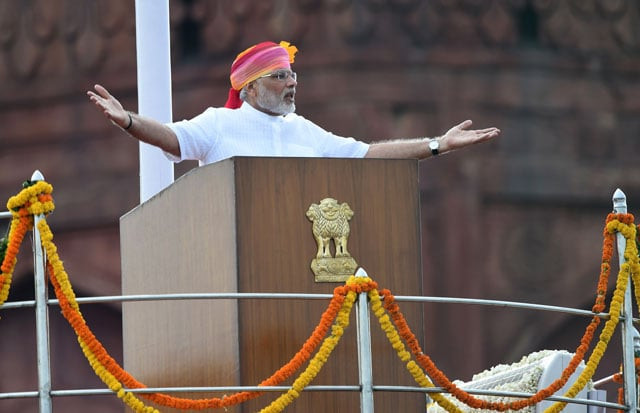FO says Modi crossed red line on Balochistan
Warns that Indian PM’s speech could have dire implications on bilateral ties

Indian Prime Minister Narendra Modi gestures as he delivers his Independence Day speech from The Red Fort in New Delhi on August 15, 2016. PHOTO: AFP
Speaking at his weekly news briefing, the Foreign Office spokesperson warned that Modi’s Independence Day speech in which he accused Pakistan of committing human rights violations in Balochistan could have serious implications for bilateral ties.
“I would like to draw your attention to Special Assistant to the Prime Minister Tariq Fatemi’s interview of yesterday in which he said that the Indian premier crossed a red line,” Nafees Zakaria told reporters. He said Modi tried, albeit without success, to cover up “India’s state terrorism’ in occupied Jammu and Kashmir.”
“The statement by the Indian prime minister includes elements that are indeed a violation of the UN Charter,” the spokesman added.
Zakaria said Prime Minister’s Adviser on Foreign Affairs Sartaj Aziz had already said in his statement that Modi’s reference to Balochistan was an admission of India’s involvement in perpetrating and financing terrorism in the province. “Public confession by Kulbhushan Yadav, the Indian intelligence agency RAW’s active service officer, is also with us as an irrefutable proof,” he pointed out. “The people of Pakistan, especially Balochistan and Karachi have been the victims of subversive and terrorist activities, sponsored by the Indian intelligence agencies,” he added.
Modi’s reference to Balochistan is seen as an attempt to counter Pakistan’s aggressive diplomacy on Kashmir. Relations between the nuclear-armed neighbors have already been tense due to war of words over Kashmir violence but Modi’s reference to Balochistan has further deteriorated their ties and many experts fear that this may ignite a new chapter of hostility.

Undeterred by the Indian strategy, the spokesperson said Prime Minister Nawaz will forcefully raise the Kashmir issue particularly with reference to what he called ongoing atrocities being committed by Indian forces there at the upcoming UN General Assembly session in New York. He said it was time that India was reminded by the UN and international community to ensure the realisation of the right to self-determination of the people of Jammu and Kashmir in accordance with UN Security Council resolutions.
When asked about the Delhi’s response to Islamabad’s offer of talks on Kashmir, Zakaria confirmed that the Indian foreign secretary formally replied to his Pakistani counterpart’s letter seeking dialogue on Kashmir.
Separately, Sartaj Aziz told reporters at a joint news conference with Norway’s foreign minister that Pakistan is currently examining India’s reply. He, however, would not comment on the content of the Indian response.
Indian media reports suggested that New Delhi expressed its willingness to hold talks, but with a condition that the agenda should be ‘cross border terrorism’ in the occupied territory.
Norway ready for mediation
Norway’s Foreign Minister Borge Brende called for breaking the impasse in ties between Pakistan and India. However, he was very cautious on the human rights violations being committed by Indian forces in Kashmir.
“All nations have the obligations to comply with the human rights and the UN charter,” he said in response to a question at news conference after talks with his Pakistani counterpart.
But when asked further as to why western countries, including Norway, were reluctant to condemn India for violating human rights in Kashmir, the Norwegian minister said he did not want to add to the already tense situation.
“I think I am most helpful when I am in Islamabad to say that first we as friend of Pakistan and also as friend of India to do our utmost to mitigate tensions and not add fire to this,” he explained the reason behind his guarded statement. “If I make a very strong statement from Islamabad, I think you understand that it will be counterproductive,” he argued.
Oslo, according to him, is ready to play its part in breaking the deadlock but for that purpose both sides have to agree to its role.
Meanwhile, responding to the offer of the UN high commissioner for human rights to send a fact-finding mission to both Indian Kashmir and Azad Jammu and Kashmir (AJK), the FO in a statement said that the situation in the region had deteriorated further since Pakistan had written to the world body.
The FO spokesman said AJK was an area open to everyone and was frequented by foreign tourists and members of the diplomatic community in Pakistan, including representatives of the UN, who had observed recent elections in the region and met a cross-section of people.
“Access to OHCHR has been denied by India to Indian Occupied Jammu and Kashmir. Pakistan has never prevented UN officials from travelling to Azad Jammu and Kashmir,” Zakaria pointed out.
However, while welcoming any UN team that the UN High Commissioner for Human Rights may wish to send to AJK, the spokesperson said Pakistan will not accept equating the rampant human rights violations in Indian Kashmir with the situation in AJK.
“In fact, today the contrast between the grim reality in Indian Occupied Kashmir and the peaceful situation in AJK could not be more stark. It is, therefore, essential that the UN fact-finding team visit Indian Occupied Kashmir,” Zakaria stressed.
Published in The Express Tribune, August 19th, 2016.



1725254039-0/Untitled-design-(24)1725254039-0-208x130.webp)















COMMENTS
Comments are moderated and generally will be posted if they are on-topic and not abusive.
For more information, please see our Comments FAQ